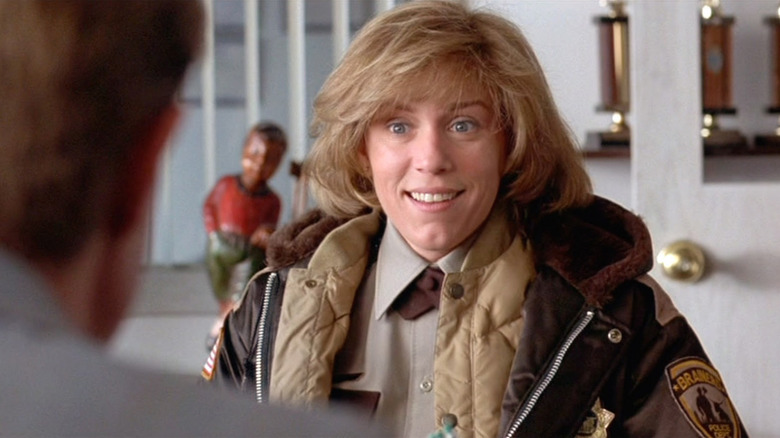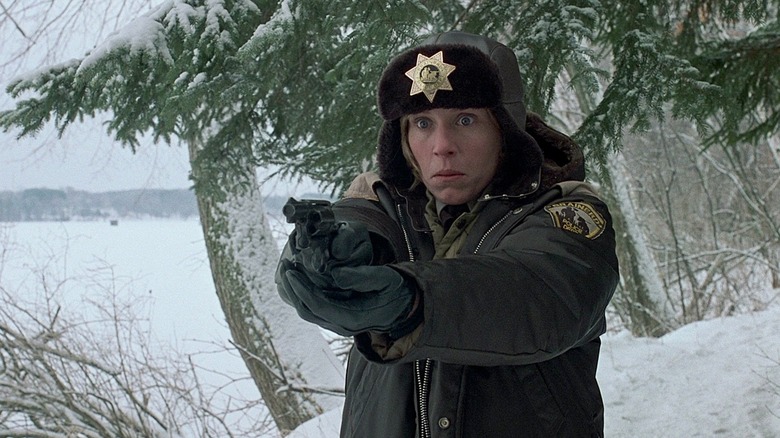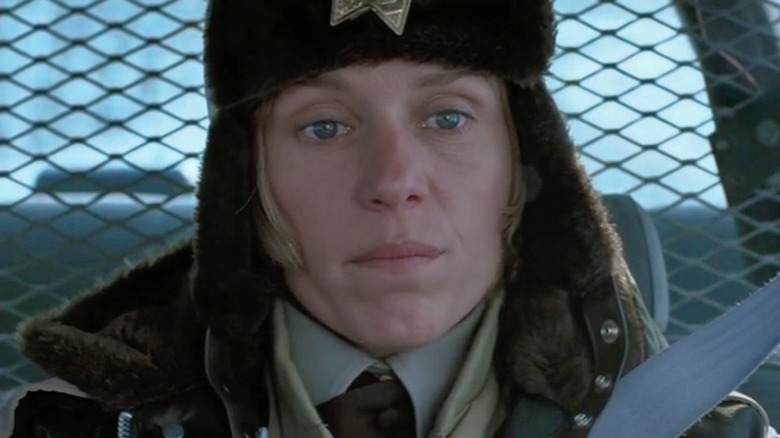One Cut Frances McDormand Fargo Scene Would Have Changed Her Character In A Major Way
1996 was, generally speaking, not a stellar year for film. The year's blockbusters were limp, containing Roland Emmerich's gloriously silly "Independence Day," Michael Bay's insufferable "The Rock," the undeniably thin "Twister," and the weirdly cold "Mission: Impossible." 1996 was also the year we had to squint and pretend that Cameron Crowe hadn't lost his mojo with "Jerry Maguire," as well as the year MTV convinced us that the terrible "Romeo + Juliet" was a good movie. On top of all that, 1996 saw the execrable "Space Jam" inflict its unholy existence upon the world.
(Warning: Your opinions on these films may differ from this writer's. Moving right along...)
But there were a few high points, too. Kenneth Branagh's "Hamlet" may be one of the best Shakespeare-to-film adaptations ever made, while Tim Burton's "Mars Attacks!" was a breath of fresh, zany air. Olivier Assayas' "Irma Vep" is a strange film experiment, and Steven Soderbergh's "Schizopolis" is hilarious and truly unique. Finally, at the top of most cinephiles' lists of the best films of the year sits the Coen brothers' detective story, "Fargo."
"Fargo" is about the world's most pathetic man, Jerry Lundegaard (William H. Macy) who, desperate for money, hires a pair of kidnappers (Steve Buscemi, Peter Stormare) to kidnap his wife. His hope is that his father-in-law will pay the ransom, and Jerry will get a cut. As is natural in a Coen Bros. film, everything goes horribly awry. Investigating the crime is the highly capable and very pregnant Marge Gunderson (Frances McDormand), a bright-eye sheriff who, despite her affable, home-fried personality, is quite a good cop.
In a 2021 retrospective printed in The Guardian, to celebrate the film's 25th anniversary, McDormand and Joel Coen recalled an early version of the script that would have cemented Marge's political beliefs. In that draft, Marge was to attend a right-to-life rally.
Yah, you betcha
Frances McDormand has maintained she likes to keep her personal politics, well, personal. She is, however, a staunch feminist, and has admitted that her personal politics sometimes leak into her public life in this regard. McDormand famously mentioned an inclusivity rider when she accepted her Academy Award for her performance in "Three Billboards Outside Ebbing, Missouri" in 2018. An inclusivity rider stipulates that a famous actor will refuse to appear in a studio's film unless the hired crew includes more women and minorities. It's a bargaining chip to ensure more diversity in Hollywood.
When it came to playing Marge Gunderson, McDormand didn't insist that her character project any particular political philosophy and noted only that she wanted the character to be good at her job. All of her down-home colloquialisms like "yah" and "you betcha" were written into the script, and the character was in her third trimester of pregnancy, so the temptation might have been to see her as comedic. McDormand's performance assured audiences that Marge was a competent cop and a considerate woman.
In a notable scene partway through "Fargo," Marge is invited to drive out to Minneapolis to visit an old friend Mike (Steve Park), and she ends up having the most awkward dinner imaginable. Mike ends up flirting and then breaking down crying. In an early draft of the script, however, Marge's motivation for visiting Minneapolis wasn't a dinner with Mike, but a political rally with him. McDormand, in the Guardian retrospective, pushed co-director Joel Coen — also her husband — into revealing details, and he merely said: "Her friend invited her to a right-to-life protest!"
Right-to-life protests
Tony Kaye's 2006 documentary film "Lake of Fire" traces the history of abortion debates in the United States and its parallel rise with a certain variety of intensely dogmatic Evangelical churches. The film points to the strange, fevered pitch the debate reached, and is careful to show that abortion was explicitly designed to stoke political ire and draw conservatives to the ballot box. In 1996, many "Fargo" audiences likely remembered coverage-hungry groups like Operation Rescue, a poorly organized cadre of anti-abortion protestors. Such groups would occasionally appear on the news, and many of them were backed by slick-haired televangelists.
The Coens' actual politics, like Frances McDormand's, have never been explicitly put on the record, but one can sense an undercurrent of populism in their work. Many of their main characters are insecure or put-upon working-class people who are kept beaten down by the larger strictures of the law, of politics, of gangland rules, of Hollywood screenwriting, or of religion. One might accuse them of standing up for the Working Man in a similar way that Frank Capra might have in a previous generation, perhaps even supporting a right-wing philosophy of "small government."
But the Coens' overwhemling irony and sardonic sense of humor undercuts that notion. The characters are just as trapped by their own limitations and foibles as they are put upon by outside forces. The world, it seems, exists to punish the passionate. One might, in a darker mood, even call the Coens cynics, bitter about politics on both the right and the left.
Marge Gunderson being an anti-abortion protestor certainly would have altered the audience's view of the character, as well as given the film a definite political bent. Perhaps that was too definite for the filmmakers, and they cut out Marge's protest as a result.


